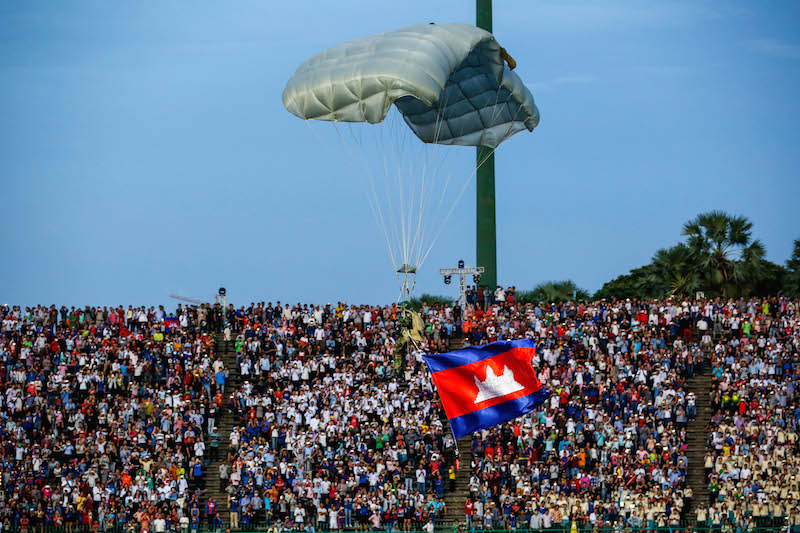Speaking out against the ruling party can be a dangerous endeavor these days.
—News Analysis—
Almost 30 government critics have been jailed over the past two years; anti-government Facebook posts are becoming common grounds for arrest; defamation lawsuits against opposition politicians are frequent; and a Cambodian-Australian politician was even banned from the country for calling the CPP a “beast.”

But that doesn’t mean the CPP is not a fun crew to party with. Or at least that is what Prime Minister Hun Sen and his long-ruling regime seem to be trying to convince people through increasingly frequent and lavish public spectacles.
Speaking from a balcony overlooking the crowd at the grand opening ceremony of the country’s first National Games last month, Mr. Hun Sen said the competition involving 2,000 of Cambodia’s top athletes marked a great moment for sports.
“This is also a political message to clarify and show the peace and stability of our nation,” he said. “There is no individual or group that can capture Cambodia as a hostage.”
The National Games, which drew some 60,000 spectators to the opening ceremony alone and were broadcast nationally by BTV (a station controlled by Mr. Hun Sen’s daughter, Hun Mana), were only the latest example of the CPP’s efforts to project a friendly face as it also seeks to suppress dissent in its many forms.
The Angkor Sankranta New Year festival in Siem Reap City, organized by a youth group headed by Mr. Hun Sen’s youngest son, Hun Many, was launched as an annual event just a few years ago and now attracts tens of thousands of young Cambodians for a celebration presided over by the CPP elites.
The national football team, having long been a hapless and unskilled bunch, is now rising through the global rankings, and thanks to its success and accompanying marketing push—games are broadcast live on BTV and on Mr. Hun Sen’s Facebook page—regularly brings out tens of thousands of fans to Olympic Stadium.
And the Water Festival, which went terribly wrong in 2010 when a stampede killed 353 people on its final night, is back this year with nine concert stages set up across the city, 259 teams competing in the boat races and City Hall estimating—perhaps optimistically—that 2 million people will take part in the three-day festivities that started on Sunday.
If the 2013 election taught the ruling party anything, it is that old strategies built around reminders of the country’s dark history need to be updated to connect with an electorate that is rapidly becoming younger.
“Youth is the key demographic group for upcoming elections and consequently we are seeing a rejuvenation, or perhaps infantilisation, of politics,” said Astrid Noren-Nilsson, a political scientist who authored “Cambodia’s Second Kingdom: Nation, Imagination, and Democracy.”
“Putting on awesome spectacles creates an aura of optimism and sends a signal about hopefulness about the future. This is surely designed to improve the CPP’s image among youth, given that in the last elections the party came across as fearful of change, which repelled young voters,” she said in an email.
“An impact would however likely be limited to politically uninterested young people,” she added. “Next to representing change, another key attractive trait for youth voters tends to be authenticity.”
Sok Eysan, a CPP spokesman, said the party’s decision to put resources into the events was meant mainly to fulfill its mandate of improving the lives of the people, though he admitted that the spectacles were also expected to boost support.
“You can’t say it is entirely not for promotion, but the party is working hard to build achievements in order to increase the confidence from citizens. And with increased popularity due to our work, the citizens will support us more,” Mr. Eysan said.
“These actions will increase the popularity to the government, but that doesn’t mean we do these big events for political promotions,” he added. “We have to do this work anyway, not only this but with all the sectors including these big events. If we don’t do it, the opposition party would say we are useless and not doing anything for these historical events.”
While grand spectacles may leave people feeling good for a little while, the impact was unlikely to change opinions at the ballot box, said John Ciorciari, a Southeast Asia scholar at the University of Michigan’s Ford School of Public Policy.
“Research suggests that the electoral benefits to incumbents from sporting spectacles or a big home team victory tend to be modest and fleeting,” he said in an email.
“If Cambodia pulls off the upcoming events successfully, some Cambodians may form a more favorable view of the government’s prowess, at least for a little while. But even a positive afterglow isn’t likely to put much dent in the opinion of many Cambodian youth that the government is insufficiently accountable and out of touch with the needs and aspirations of ordinary people.”
Whatever success the ruling party has in winning affection through entertaining the population, it will not be enough on its own to significantly change the sentiment of young people who are angry with their lack of options, said Cham Bunthet, a political analyst and policy adviser to the Grassroots Democracy Party.
“I think this is good to mobilize the spirit of Khmer people,” he said of the National Games and other activities, all of which have a strong theme of national pride.
“But I don’t think that would change the view of young people,” he said. “What the government should do is not just events, but create jobs, opportunities, improve the quality of education, the justice and legal systems.”
“When I go to talk with young people, the views they share are not from those fun events. They want a better quality of education and they want jobs,” he added. “I think if the government doesn’t work on that, the young voters will all look for other parties.”
(Additional reporting by Hang Sokunthea)



